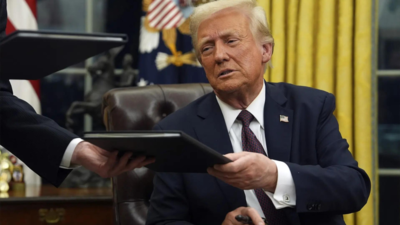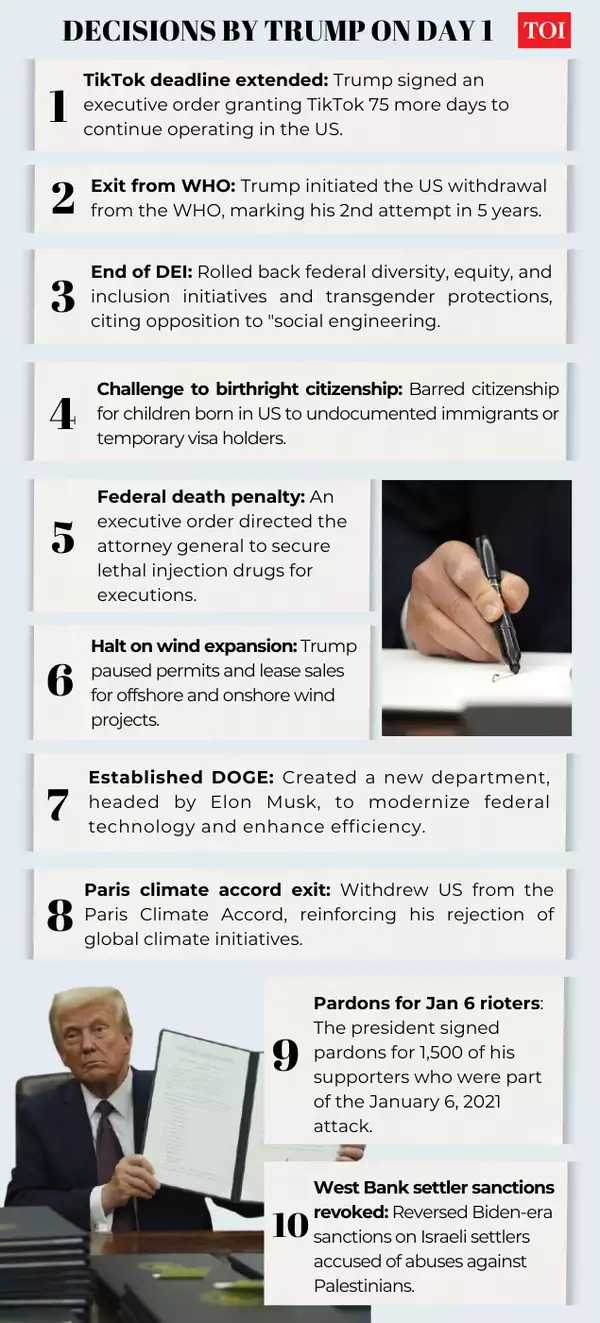
President Donald Trump’s executive order (EO) – ‘Protecting the meaning and value of American citizenship,’ has left the Indian diaspora stunned. Many believed that Trump’s speeches during his campaign trail of ending ‘citizenship by birth’ would apply only to children of illegal immigrants. The overarching belief of many Indian families was that documented (legal) immigrants like the H-1B holdePresident Donald Trump’s executive order (EO) – ‘Protecting the meaning and value of American citizenship,’ has left the Indian diaspora stunned. Many believed that Trump’s speeches during his campaign trail of ending ‘citizenship by birth’ would apply only to children of illegal immigrants. The overarching belief of many Indian families was that documented (legal) immigrants like the H-1B holders, or those on other work visas like the L (intra-company) visa, or even a F (student) visa, would not be impacted. They are in for a rude shock.
More than a million Indians who are in a decades-long queue for an employment-linked green card will be impacted going forward, as a child born in a family (thirty days from the date of the EO) where the mother is here lawfully but temporarily (eg: as a visitor or on a non-immigrant visa – be it a dependent visa like H-4 or even a work visa) and the ‘father’ is not a green card holder or US citizen will not get automatic American citizenship.
Also read: First lawsuit filed in US district court contesting end to citizenship by birth

According to an analysis of the US Census (2022) done by Pew Research, the US was home to about 4.8 Indian Americans, of whom 34% or 1.6 million were born in the US (and became American citizens by virtue of birth).
The proposed plan of action is now a reality. Currently, those children who are not born in the US, and whose families are caught in the decades long green card backlog have to self deport on turning 21 or have to opt for another visa – say an international student visa. Citizenship by birth at least gave Indian couples waiting endless in queue for a green card a breather, If their child was born on American soil.
Also read: Indian diaspora with ageing children a worried lot
Trump’s executive order points out that the 14th Amendment has never been interpreted to extend citizenship universally to everyone born within the US. It has always excluded from birthright citizenship persons who were born in the US but not ‘subject to the jurisdiction thereof.’
In the context of legal immigrants, it adds: “The privilege of US citizenship does not automatically extend to persons born in the US: When the mother’s presence in the US at the time of said person’s birth was lawful but temporary (such as, but not limited to, visiting the US under the auspices of the Visa Waiver Program or visiting on a student, work, or tourist visa) and the father was not a US citizen or lawful permanent resident (which means a green card holder) at the time of said person’s birth.”
According to immigration attorneys ‘citizenship by birth’ is enshrined in the 14th amendment to the US constitution. The first lawsuit challenging this executive order has been filed by immigration right activists such as the American Civil Liberties Union (ACLU) and others.
Cyrus D. Mehta, New York based immigration attorney told TOI: “If both parents are in the US in a non-immigrant status, such as in H-1B and H-4 (dependant visa) status, under Trump’s EO the State Department will not issue a US passport to the child as they are no longer regarded as ‘subject to the jurisdiction thereof’. This EO will obviously be challenged in court, but I can see the Trump administration taking this all the way to the Supreme Court in the hope that the majority of conservative justices could agree with Trump’s new interpretation of the 14th Amendment.”
“If the courts agree with Trump’s interpretation, going forward children of H-1B and H-4 non-immigrants who are born in the US, will not be recognized as US citizens. There is a ripple impact. Many Indians are caught in 100 year employment-linked green card backlogs, and so their only hope was for their child born in the US to sponsor them, when he/she attained 21 years. Now this will not be possible”
Also read: Hiring freeze could lead to immigration processing delays, say experts
Greg Siskind, co-founder of Siskin Susser, an immigration law firm, said: “The unconstitutionality of this is stunning. The term ‘subject to the jurisdiction thereof’ was never intended to apply to those targeted by the EO. It was meant to apply to diplomats who are not subject to the jurisdiction of the US. This is going to be litigated and I predict it will be enjoined before it is effective in 30 days. But obviously there’s no guarantees here,”
Fiona McEntee also pointed out the gender-play here, “And yes, the EO uses the terms father and mother because obviously every child is born into a family with a mother and father!!!!”
Ashwin Sharma, immigration attorney told TOI, “The phrase ‘subject to the jurisdiction thereof’ has been consistently interpreted to include nearly all individuals born on US soil, irrespective of their parents’ immigration status, other than children of enemy occupiers or diplomats. A landmark Supreme Court case reaffirmed this interpretation, granting citizenship to a child born in the US to Chinese immigrant parents who were not US citizens. This decision established a precedent which leaves little room for reinterpretation.”
The fate of children who have non-citizen, non-green card holder parents now vests with the US courts.rs, or those on other work visas like the L (intra-company) visa, or even a F (student) visa, would not be impacted. They are in for a rude shock.
More than a million Indians who are in a decades-long queue for an employment-linked green card will be impacted going forward, as a child born in a family (thirty days from the date of the EO) where the mother is here lawfully but temporarily (eg: as a visitor or on a non-immigrant visa – be it a dependent visa like H-4 or even a work visa) and the ‘father’ is not a green card holder or US citizen will not get automatic American citizenship.
Also read: First lawsuit filed in US district court contesting end to citizenship by birth
The proposed plan of action is now a reality. Currently, those children who are not born in the US, and whose families are caught in the decades long green card backlog have to self deport on turning 21 or have to opt for another visa – say an international student visa. Citizenship by birth at least gave Indian couples waiting endless in queue for a green card a breather, If their child was born on American soil.
Also read: Indian diaspora with ageing children a worried lot
Trump’s executive order points out that the 14th Amendment has never been interpreted to extend citizenship universally to everyone born within the US. It has always excluded from birthright citizenship persons who were born in the US but not ‘subject to the jurisdiction thereof.’
In the context of legal immigrants, it adds: “The privilege of US citizenship does not automatically extend to persons born in the US: When the mother’s presence in the US at the time of said person’s birth was lawful but temporary (such as, but not limited to, visiting the US under the auspices of the Visa Waiver Program or visiting on a student, work, or tourist visa) and the father was not a US citizen or lawful permanent resident (which means a green card holder) at the time of said person’s birth.”
According to immigration attorneys ‘citizenship by birth’ is enshrined in the 14th amendment to the US constitution. The first lawsuit challenging this executive order has been filed by immigration right activists such as the American Civil Liberties Union (ACLU) and others.
Cyrus D. Mehta, New York based immigration attorney told TOI: “If both parents are in the US in a non-immigrant status, such as in H-1B and H-4 (dependant visa) status, under Trump’s EO the State Department will not issue a US passport to the child as they are no longer regarded as ‘subject to the jurisdiction thereof’. This EO will obviously be challenged in court, but I can see the Trump administration taking this all the way to the Supreme Court in the hope that the majority of conservative justices could agree with Trump’s new interpretation of the 14th Amendment.”
“If the courts agree with Trump’s interpretation, going forward children of H-1B and H-4 non-immigrants who are born in the US, will not be recognized as US citizens. There is a ripple impact. Many Indians are caught in 100 year employment-linked green card backlogs, and so their only hope was for their child born in the US to sponsor them, when he/she attained 21 years. Now this will not be possible”
Also read: Hiring freeze could lead to immigration processing delays, say experts
Greg Siskind, co-founder of Siskin Susser, an immigration law firm, said: “The unconstitutionality of this is stunning. The term ‘subject to the jurisdiction thereof’ was never intended to apply to those targeted by the EO. It was meant to apply to diplomats who are not subject to the jurisdiction of the US. This is going to be litigated and I predict it will be enjoined before it is effective in 30 days. But obviously there’s no guarantees here,”
Fiona McEntee also pointed out the gender-play here, “And yes, the EO uses the terms father and mother because obviously every child is born into a family with a mother and father!!!!”
Ashwin Sharma, immigration attorney told TOI, “The phrase ‘subject to the jurisdiction thereof’ has been consistently interpreted to include nearly all individuals born on US soil, irrespective of their parents’ immigration status, other than children of enemy occupiers or diplomats. A landmark Supreme Court case reaffirmed this interpretation, granting citizenship to a child born in the US to Chinese immigrant parents who were not US citizens. This decision established a precedent which leaves little room for reinterpretation.”
The fate of children who have non-citizen, non-green card holder parents now vests with the US courts.
Source: https://search.app/MEuTZ1VRXBZRSW3z6

